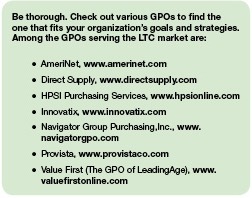GPOs offer bottom-line advantages
Whether you’re looking for one hospital bed or 300, the latest in non-slip vinyl tiles, nutritional supplements or a host of other products and services necessary for a well-run facility, the best bet for the best price is to work with a group purchasing organization (GPO). GPO membership can benefit small chains or single-site facilities as well as large multisite, multistate organizations.
Long-Term LivingExecutive Editor Sandra Hoban spoke with John Sganga, CEO of Innovatix and Steve Tackett, vice president, National Accounts and Non-Acute, at AmeriNet, to get some tips and suggestions for getting the most out of your GPO experience.
Is GPO membership for everyone? Can a small facility or chain realize benefits?
Sganga: Yes,GPOs can benefit any facility. Any organization can take advantage of GPO offerings regardless of its size. Saving money is the name of the game.
Tackett:GPOs are an important resource in the LTC field because, in many cases, a facility has limited resources in the supply/procurement chain. The savings realized frees up a facility’s limited resources to focus on other priorities.
What, if any, products would a facility be better off buying locally and/or as-needed?
Sganga: With reductions in reimbursement, facilities don’t have the time to send staff to the local Costco or Target to pick up items as needed. GPOs provide an efficiency using the supply chain. I’m sure that you can find a lower-priced product locally at times, but at what expense in staff time? Is it really a savings? If a facility works with a GPO, nine out of ten times, it will find the right price, the best price.
Tackett: And that’s because of a GPO’s breadth of contracts with suppliers. Savings and operational efficiencies can be realized in areas including food/nutrition, medical supplies, housekeeping, IT and more.
For larger facilities, where can the most savings be found?
Sganga: An organization with multiple facilities in multiple geographic areas can save by placing one order to fit its needs. For example, if 200 pressure-relief mattresses are earmarked for four different states, there is no difference in pricing. Distributors have no problem getting products to their destinations, so shipping and handling isn’t a problem.
Tackett: I agree. The GPO’s role is to identify the specific requirements of the transaction and then to engage the supplier partner to provide a solution. The GPO works with individuals higher in the supplier community that can make things happen that perhaps the local representative doesn’t have the clout to deliver.
What are some common mistakes purchasers make and how are they solved?
Sganga: One of the common mistakes made is purchasing office supplies. The customer needs to look at all the distributor’s offerings—not just the single item they are looking for. You don’t go to Staples just for staples. The facility purchasing manager or the individual assigned to procurement should be familiar with what is on their contract with the GPO.
When making major purchases, such as pressure-relief mattresses, the customer should enlist the services of the GPO’s analytics department. Most GPOs offer this service. They will go through all the price points and quality categories to determine the best product and value for the member.
Tackett: Another common mistake is failing to confirm that the supplier is aware of your GPO membership and is providing GPO pricing, terms and conditions at the time of order. If this is overlooked, it might require having the GPO intervene on the customer’s behalf to resolve the problem.
For the purchaser, is it better to place orders as needed, quarterly or during special pricing promotions?
Sganga: I believe that the less you stock up, or overstock, the better. You don’t want to pay for supplies that take up room and sit on the shelves. However, purchasing durable goods, like beds, often give the manufacturers an opportunity to work with you on pricing.
Tackett: Along with available storage space, the purchaser should consider the outdating, or expiration, of supplies in a closet. Other customized arrangements can be achieved by buying the product upfront but taking delivery as needed. The key is to perform the value analysis for the cost/benefit calculation.

What advice can you offer on selecting and working with a GPO?
Sganga: Understand what each GPO offers and the strength of their portfolio in the LTC market. Many facilities don’t realize that a GPO can save them money on construction materials, for example. If your GPO’s portfolio aligns with the general contractor’s specifications, building materials can be purchased at a great rate.
Challenge your GPO to provide services outside the general product area. Innovatix, for example, is about to launch an insurance program for skilled nursing facilities.
Tackett: The LTC organization needs to consider the focus and depth a particular GPO has in the non-acute trade. This is very important. AmeriNet also provides additional benefits that go beyond basic offerings. For example, we offer member facilities a cell phone contract to help their employees save money. Encourage your GPO to bring additional and creative services to the table.
|

Sandra Hoban was on I Advance Senior Care / Long-Term Living’s editorial staff for 17 years. She is one of the country’s longest-serving senior care journalists. Before joining Long-Term Living, she was a member of the promotions department at Advanstar Communications. In addition to her editorial experience, Sandi has served past roles in print and broadcast advertising as a traffic and talent coordinator.
Related Articles
Topics: Articles , Facility management , Operations











